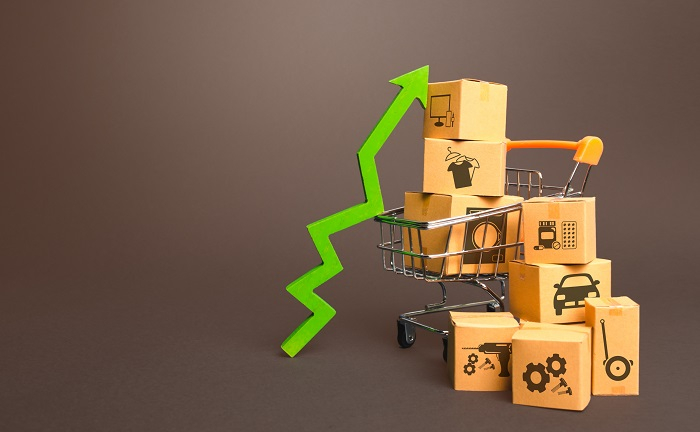
 Data Structure
Data Structure Networking
Networking RDBMS
RDBMS Operating System
Operating System Java
Java MS Excel
MS Excel iOS
iOS HTML
HTML CSS
CSS Android
Android Python
Python C Programming
C Programming C++
C++ C#
C# MongoDB
MongoDB MySQL
MySQL Javascript
Javascript PHP
PHP
- Selected Reading
- UPSC IAS Exams Notes
- Developer's Best Practices
- Questions and Answers
- Effective Resume Writing
- HR Interview Questions
- Computer Glossary
- Who is Who
What Do You Mean by Consumerism?
Consumerism is the belief that increasing the consumption of products and services obtained via the market is always a worthwhile objective and that acquiring consumer products and material belongings is essential to a person's happiness.
The term "consumerism" in economics mainly applies to the Keynesian notion that consumer spending is the main engine of the economy and that promoting consumer expenditure is a key objective of public policy. This viewpoint views consumption as a beneficial phenomenon that stimulates economic expansion. Others view the desire for greater material goods as a problem that damages societal cohesion and breeds personal insecurity.
Additionally, financial processes increased consumption. With the introduction of credit cards, people were able to make purchases. Debit cards frequently featured the option of overdraft functionality and allowed individuals to quickly access more money than they presently have.
Importance and Impact of Consumerism
Although consumer culture is still pervasive, some argue that it is no longer sustainable because of environmental issues. Maximizing the utilization and accessibility of privately held goods and services is the main focus.

For many societies, consumerism has sociological and environmental repercussions. The world of today requires businesses to accept accountability for their activities and products. The axiom "the customer is always right" was born as a result. Regulation of the manufacturing of goods, resources, and other factors has been brought about by consumerism. Due to the fact that they have enabled the production of so many things, these procedures also significantly harm the environment in both direct and indirect ways.
Advantages and Disadvantages of Consumerism
Just like every coin has 2 sides, consumerism also has a few advantages and disadvantages.
Advantages
Supporters of consumption highlight how consumer spending boosts the economy and results in more goods and services being produced. A rise in private spending can result in an uptick in GDP. Retail sales, private consumption, and consumer confidence indices all point to strong consumer demand in the United States. The selling of consumer goods can be profitable for entrepreneurs, industrialists, and owners of commodities, either directly or indirectly through downstream customers.
Others recommend consumption because of the following ?
It allows people the freedom to give in to their passions.
It keeps money moving around.
Consumerism supports a thriving economy.
Disadvantages
Cultural factors are frequently used to critique consumerism. Some contend that consumerism can result in a society that is purely materialistic and disregards other values. A concentration on mass consumption of ever-expensive commodities can supplant conventional industrial processes and lifestyles.
By encouraging the creation and consumption of internationally marketed items and brands that could be at odds with regional social and economic patterns of activity, consumerism is frequently linked to globalization. Additionally, consumerism can lead to unmanageable debt for consumers and contribute to financial crises and recessions.
For the following reasons, some individuals hold unfavorable views regarding consumption.
Pollution of the environment can result from consumerism.
The natural resources of the planet can be savaged by consumerism.
Consumption is bad for the environment and society.
Examples of Consumerism
The constant need to shop and consume is what defines consumerism. One example is shopping. A lot of people are drawn to it in particular because of events like the Black Friday sale the day following Thanksgiving.
The annual launch of new smartphone models is another illustration of consumerism. Even while mobile gadgets that existed a few years ago are still completely adequate and functional, consumerism encourages consumers to regularly stop using them and replace them with new ones.
Another illustration is ostentatious consumption. People buy things in this place to demonstrate their status or to project a particular image. This can also signify prosocial conduct; therefore, it doesn't necessarily need to have a bad connotation.
According to a study from 2000 by Ackerman, MacInnis, and Folkes, consumers may be less satisfied with a product, whether they own the same one or an earlier one, and more likely to seek another one. been demonstrated. This explains why businesses like Apple upgrade their technology products frequently since people have an "endless drive for more" (Campbell, 1989). In fact, the consumer society convinces people that people are necessary to their existence and well-being, which encourages them (with the aid of advertising and the media) to adjust to this consumerist way of life.
The Probable Effects of Consumerism
Most global economies are beginning to exhibit a consumerist trend. It is a typical occurrence in the Western, but it is now frequent in the world's emerging nations as well. Consuming items more frequently is referred to as consumerism. The economy is based on the creation and exchange of products. The total amount of produced goods and services at a specific time and over a specific period of time is known as the gross national product. The economic growth rate increases as more things are created and consumed by society. The per capita income of a country's citizens serves as a barometer of its prosperity. When people have a lot of purchasing power, economies grow.

People replace their items with new ones in a consumption society. They purchase items, use them, and then discard them. As products mature, newer ones take their place. Nothing needs fixing. People have plenty of money to spend on items. If this isn't done, there will be recessions, depressions, and possibly unemployment.
Consumption also has an impact on society's culture and contributes to world inequality. The gap between the rich and the poor is growing as the rich get richer and the poor get poorer. For instance, in 2005, 10% of the world's richest people devoured 59% of the world's resources. This demonstrates how consumption and globalization cause an unequal distribution of income. Additionally, output rises along with commodity demand, which results in more pollution, more land use, and a loss of natural resources. The ocean is turning into a massive garbage dump as waste dumping becomes a global issue. Consumerism causes resource scarcity, resource depletion, and environmental damage.
Conclusion
In conclusion, consuming is more than what a person actually requires and has both benefits and drawbacks. The drawbacks, however, exceed the advantages. It had a tremendous impact on a person's psyche and contributed to the emergence of a chronically unhappy mental state. Consumerist ideologies pose a threat to the spiritual bond between people and nature. We require a profound transformation.
Social factors, particularly consumer society and marketing, inspire people to be themselves, embrace their individuality, and experience freedom. But this leads to a significant dilemma. The tragedy of this society is when someone believes they have genuinely created a concept that speaks to them, that it is original and different, only to later discover that they are repeating the same action.
Resources need to be safeguarded and preserved for future generations. A crucial tool in combating this worldwide issue is teaching people about this unsustainable consumption. Institutions must also imply significant changes and improvements.

